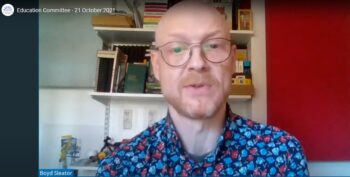 The Integrated Education Bill won’t foster respect and understanding between religion and belief groups if it doesn’t require integrated schools to have a fully inclusive ethos, Northern Ireland Humanists has told Stormont’s Education Committee.
The Integrated Education Bill won’t foster respect and understanding between religion and belief groups if it doesn’t require integrated schools to have a fully inclusive ethos, Northern Ireland Humanists has told Stormont’s Education Committee.
In an oral evidence session, Northern Ireland Humanists told the Committee that the Bill must address Christian bias in the education system to achieve its aims. These include promoting ‘good relations’ between different communities, as well as ‘respect for identity, diversity, and community cohesion.’
At present, Northern Ireland’s education system is highly segregated. Most pupils from Catholic backgrounds attend Catholic schools. The vast majority of pupils from Protestant backgrounds attend controlled schools. This means pupils miss out on the benefits of mixing with children from other backgrounds. By contrast, integrated schools seek to balance the proportion of pupils from different backgrounds they admit. They aim at 40% from Catholic backgrounds, 40% from Protestant backgrounds, and 20% from other backgrounds (including the non-religious and those from minority faiths). This means that children with a range of beliefs are educated together. But, since only 7% of Northern Ireland’s schools are integrated, most families are unable to access one.
The Bill seeks to expand integrated education. It will do so by introducing a legal presumption that new schools will be integrated. It will also require the Government to promote integrated education. In addition, the Bill widens the definition of integrated education so it includes the non-religious and those from minority faiths. At present, this definition only refers to Protestants and Catholics.
However, the Bill does not attempt to remove the presumption that integrated schools have a ‘Christian character’. Indeed, Kellie Armstrong, who tabled the Bill, explicitly stated that ‘nothing in the Bill takes away from the Christian basis of all schools in Northern Ireland’.
This ‘Christian basis’ includes daily acts of compulsory collective worship. It also involves largely Christian religious education (RE) taught using a syllabus written by the four main churches. It includes just one unit (at secondary school level) on world religions. Non-religious perspectives like humanism are not covered at all. But, as Mr Sleator told the Committee, without a curriculum that treats different religions and beliefs equally, ‘efforts to diversify pupil intake can never be fully inclusive’. This is because ‘children from non-Christian backgrounds are being sent a clear message that their own beliefs are not as highly valued as those of Christianity’.
Dr Ruth Wareham from Humanists UK added that ‘integrated schools in particular must be allowed to operate without the discriminatory burden of collective worship and Christian RE’. Instead they should ‘introduce inclusive assemblies and pluralistic RE that teach about religion or belief in an objective way to fully support a fair and equal ethos in their schools.’
In its evidence, Northern Ireland Humanists also pointed out that the High Court in Northern Ireland recently granted a non-religious family permission to challenge laws requiring Christian RE and worship in all schools. Noting this could be a landmark case in the rights of non-religious people, Dr Wareham said that the Integrated Education Bill must urgently address these issues. Otherwise integrated schools would simply inherit the biased provision currently being delivered. She argued this is particularly important given the rise in people identifying as non-religious in Northern Ireland. The latest Life and Times Survey found that 27% of people now say they are non-religious. This is compared to 28% identifying as Catholic, 18% Presbytarian, 11% Anglican, 12% Other Christian.
Northern Ireland Humanists also submitted written evidence to the Committee.
Northern Ireland Humanists Coordinator Boyd Sleator commented:
‘This Bill represents a real opportunity to secure fair, inclusive education for all children regardless of their religion or belief. But the underlying bias towards Christianity inherent in the integrated sector must be addressed if the Bill is to meet these vitally important aims.
‘If we really want to create a more cohesive, tolerant society, then we must not only educate children from different backgrounds together, but make sure we do so in a way that treats everyone equally. We therefore hope the Education Committee takes our criticisms on board and seeks to amend the Bill so that integrated schools are required to be fully inclusive in character.’
Notes:
For further comment or information, please contact Northern Ireland Humanists Coordinator Boyd Sleator at boyd.sleator@humanism.org.uk or 07918 975 795
Watch the Education Committee evidence session (from 01:09:00 onwards)
Read our written response to the call for evidence.
Read the Integrated Education Bill.
Read our previous article on the Integrated Education Bill.
Read our report on the first Northern Ireland Catholic school to become integrated.
Attend our event on humanism and the curriculum – what teachers in Northern Ireland need to know
Read more about our work on:
Northern Ireland Humanists is a part of Humanists UK, working with the Humanist Association of Ireland. Humanists UK is the national charity working on behalf of non-religious people. Powered by over 100,00 members and supporters, we advance free thinking and promote humanism to create a tolerant society where rational thinking and kindness prevail. We provide ceremonies, pastoral care, education, and support services benefitting over a million people every year and our campaigns advance humanist thinking on ethical issues, human rights, and equal treatment for all.
In 2021, Humanists UK is celebrating its 125th anniversary with a renewed focus on its history. The new website Humanist Heritage is a rich new web resource that uncovers the untold story of humanism in the UK – a story of people, groups, objects, places, movements, publications, and ideas.
